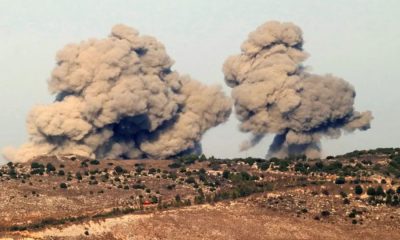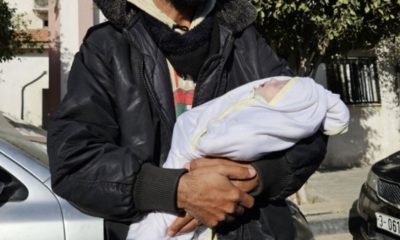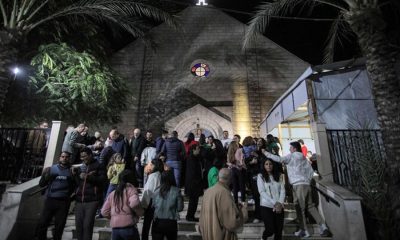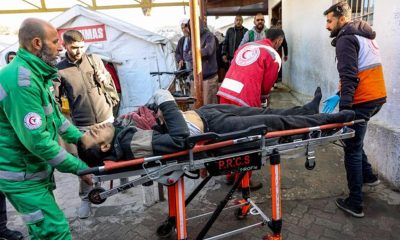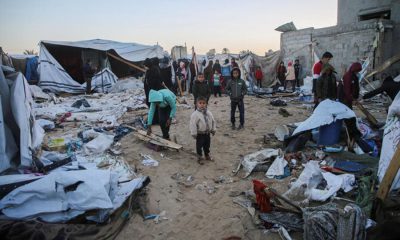International
Major parts of Gaza facing famine-like conditions – WHO
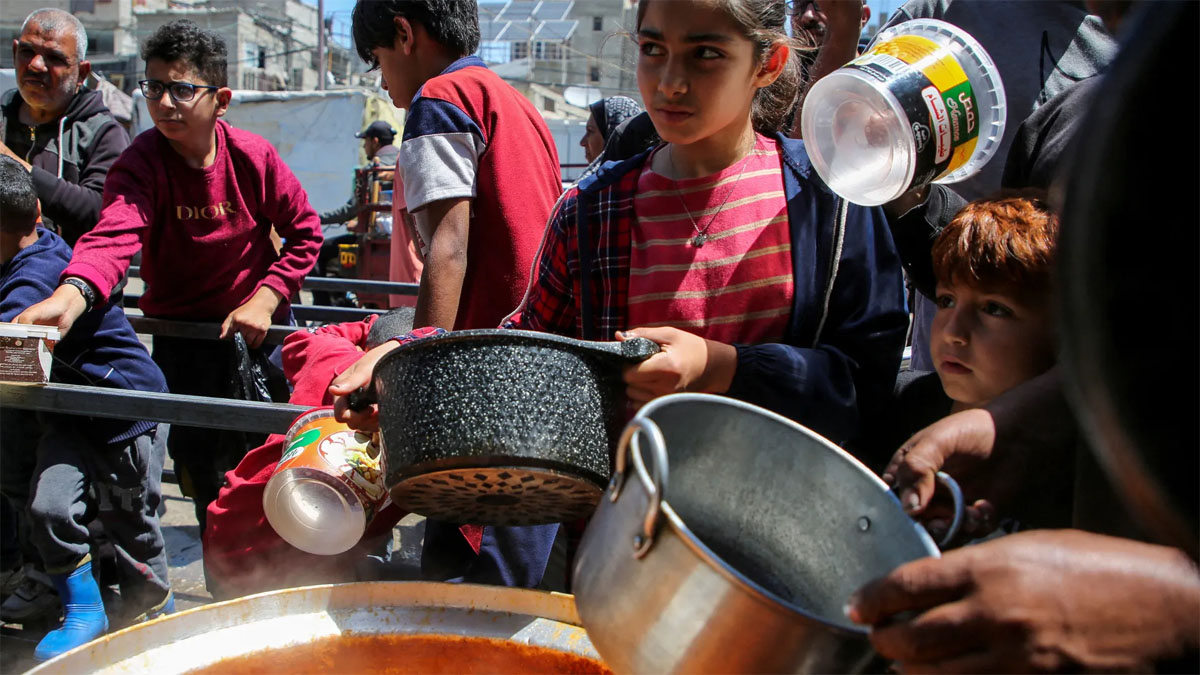
Major parts of Gaza facing famine-like conditions – WHO
Thousands of Palestinian children in Gaza have been diagnosed with malnutrition, the World Health Organization (WHO) has said, as Israel continues to severely restrict supplies of food, water, medicine and fuel to the territory.
“A significant proportion of Gaza’s population is now facing catastrophic hunger and famine-like conditions,” WHO chief Tedros Adhanom Ghebreyesus told reporters on Wednesday.
“Despite reports of increased delivery of food, there is currently no evidence that those who need it most are receiving sufficient quantity and quality of food.”
Tedros said 8,000 children under five years old have been diagnosed and treated for acute malnutrition in Gaza.
“However, due to insecurity and lack of access, only two stabilisation centres for severely malnourished patients can operate,” the WHO chief added.
Tedros said 32 deaths in the besieged Palestinian enclave have been attributed to malnutrition.
United Nations officials have warned of the risk of famine as Israel continues its war on Gaza. In January, the International Court of Justice ordered Israel to “ensure the delivery of basic services and essential humanitarian aid to civilians in Gaza”.
The UN’s top court reasserted that ruling in March, demanding that Israel take “all necessary and effective measures to ensure, without delay… the unhindered provision at scale by all concerned of urgently needed basic services and humanitarian assistance”.
Some of Israel’s closest allies, including the United States, have also called for more aid to enter Gaza and reach people in need.
Last month, Israel seized and shut down the Palestinian side of the Rafah crossing between Gaza and Egypt, which had served as a major gateway for aid and humanitarian workers.
READ ALSO:
- Gaza: US says ceasefire plan on course, cautions Hamas against proposed changes
- Decline reinstatement, follow your grandfather’s footsteps, Nyass family urges Emir Sanusi
- S’African soldier convicted of deliberately infecting girlfriend with HIV
Last month, International Criminal Court prosecutor Karim Khan requested arrest warrants for Israeli Prime Minister Benjamin Netanyahu and Defence Minister Yoav Gallant on charges of alleged war crimes, including using “starvation of civilians as a method of warfare”.
A UN-backed independent commission also accused Israel of inflicting hunger on Palestinians.
“In relation to Israeli military operations and attacks in Gaza, the Commission found that Israeli authorities are responsible for the war crimes of starvation as a method of warfare, murder or wilful killing, intentionally directing attacks against civilians and civilian objects, forcible transfer, sexual violence, torture and inhuman or cruel treatment, arbitrary detention and outrages upon personal dignity,” the panel said in a report on Wednesday.
US Secretary of State Antony Blinken said earlier this week that Israel has taken “important steps” in recent months to remove obstacles to aid delivery in Gaza, but he acknowledged that it “can and must do more”.
“It is crucial to speed up the inspection of trucks and reduce backlogs; to provide greater clarity on – and shorten the list of – prohibited goods; to increase visas for aid workers and to process them more quickly,” he said at a Gaza aid conference in Jordan on Tuesday.
Blinken, who announced $404m in new assistance to Palestinians, also called for “clearer, more effective channels” to protect humanitarian workers from military operations.
Israeli attacks have killed at least 270 aid workers in Gaza, including seven World Central Kitchen employees in April – an incident that sparked global outrage.
Aid organisations have been stressing that even the inadequate aid that gets into Gaza often fails to reach people who need it most because of the Israeli offensive.
“The US’s latest humanitarian package for Gaza is a welcome step,” the International Rescue Committee said on Wednesday. “However, the effective delivery of any financial package depends wholly on unfettered access for aid and the ability for aid workers to operate seamlessly.”
Beyond Gaza, the WHO’s Tedros highlighted a growing health crisis in the occupied West Bank, where Israeli forces have killed hundreds of people since the outbreak of the war.
“WHO has documented 480 attacks on healthcare in the West Bank since the seventh of October last year, resulting in 16 deaths and 95 injuries,” he said.
In one major incident, undercover Israeli forces raided a hospital in Jenin and killed three people inside the medical centre.
Major parts of Gaza facing famine-like conditions – WHO
International
UN health chief at Yemen airport during Israeli strikes
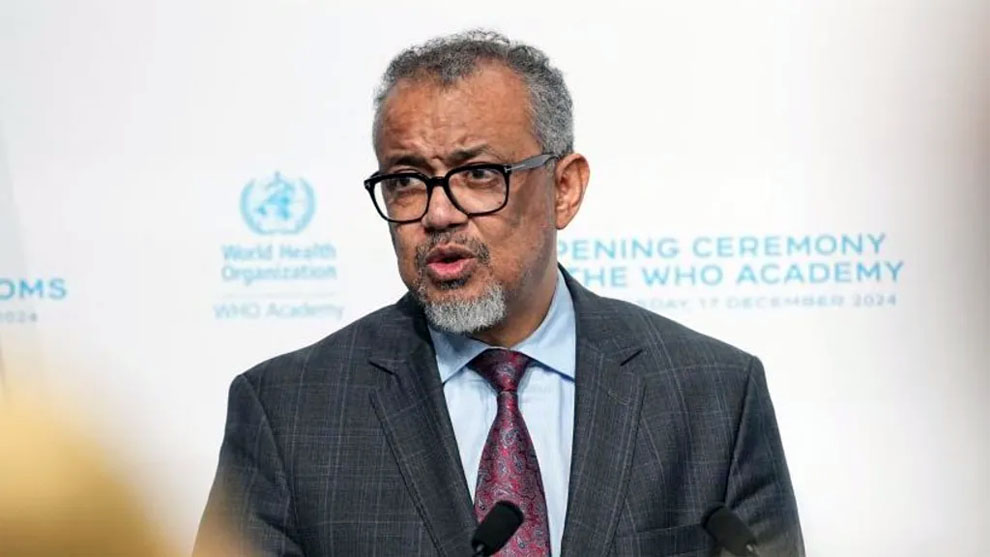
UN health chief at Yemen airport during Israeli strikes
The head of the World Health Organization (WHO) and other UN staff were at Yemen’s international airport in Sanaa on Thursday during Israeli air strikes which are reported to have killed at least six people.
WHO Director General Tedros Adhanom Ghebreyesus said they were about to board a plane when the attacks began.
Houthi-run Saba news agency said three people were killed at the airport and 30 injured. It said another three people were killed and 10 wounded in the western Hodeidah province.
The Iran-backed rebel group described the attacks – which also hit power stations and ports – as “barbaric”. Israel’s military said it carried out “intelligence-based strikes on military targets”.
It is unclear whether the fatalities were civilians or Houthi rebels.
In a statement on X, Dr Tedros said he was in Yemen “to negotiate the release of UN staff detainees and to assess the health and humanitarian situation” in the country. He provided no further details about who the UN detainees were.
Referring to the strikes on Sanaa’s airport, he said: “The air traffic control tower, the departure lounge – just a few meters from where we were – and the runway were damaged.
READ ALSO:
- BREAKING: Adeleke finally pardons ‘fowl thief’ Segun Olowookere
- Five Gaza journalists die in Israeli strike
- Mozambique: Over 1,000 prisoners escape jail as election protests worsen
“We will need to wait for the damage to the airport to be repaired before we can leave,” Dr Tedros added.
UN Secretary General António Guterres called the strikes “especially alarming”.
“I regret the recent escalation between Yemen and Israel, and remain deeply concerned about the risk of further escalation in the region.” he wrote on X.
In a statement, the Israel Defense Forces (IDF) said its “fighter jets conducted intelligence-based strikes on military targets belonging to the Houthi terrorist regime on the western coast and inland Yemen”.
It targeted “military infrastructure” at Sanaa’s airport as well as the Hezyaz and Ras Kanatib power stations, and sites in the Al-Hudaydah, Salif and Ras Kanatib ports on the west coast, the IDF said.
In comments shortly after the strikes, Israel’s Prime Minister Benjamin Netanyahu said it would “continue to cut off the terror arm of the Iranian axis of evil until we complete the job”, adding “we are only just starting with [the Houthis]”.
Early on Friday, the IDF reported that one missile fired from Yemen was intercepted before crossing into Israeli territory.
Mohammed Ali al-Houthi, head of the Houthis’ supreme revolutionary committee, called Thursday’s strikes on Yemen “barbaric” and “aggressive”.
He said that “confrontations with American and Israeli arrogance” will continue until the conflict in Gaza stops.
Several people injured by the strikes at the airport in Sanaa told Houthi-run broadcaster Al Masirah that the runway was struck three times before the airport’s control tower was also hit.
One man, who identified himself as Dr Abbas Rajeh, said the police hospital he works in treated 10 patients after the attacks – one had already died, another was in critical condition, and others had minor injuries or broken bones.
Iran described the strikes as a “clear violation of international peace and security”.
Houthi rebels have been attacking Israel since the first months of the Gaza war, which began in October 2023.
A Houthi missile strike injured more than a dozen people in Israel last week.
Israel has carried out intermittent strikes against Houthis in retaliation.
Earlier this week, Israel’s defence minister said the country was preparing to “strike hard” at the Houthis, warning it would “decapitate” the group’s leadership.
The Houthis are an armed political and religious group backed by Iran. The group has ruled large parts of western Yemen, including the capital Sanaa, since ousting the internationally recognised government in 2015.
UN health chief at Yemen airport during Israeli strikes
BBC
International
Baby freezes to death overnight in Gaza as ceasefire delays
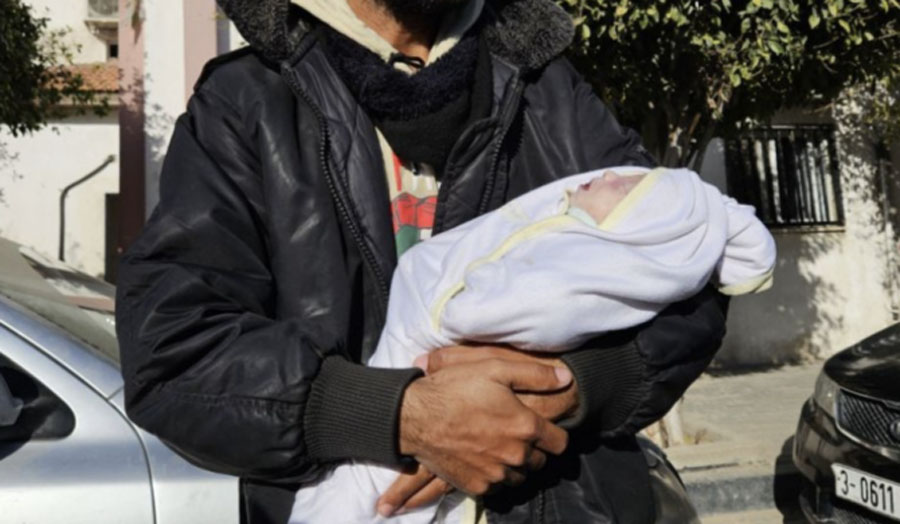
Baby freezes to death overnight in Gaza as ceasefire delays
JERUSALEM: A baby girl froze to death overnight in Gaza, while Israel and Hamas accused each other of complicating ceasefire efforts that could wind down the 14-month war.
The 3-week old baby was the third to die from the cold in Gaza’s tent camps in recent days, doctors said, deaths that underscore the squalid conditions, with hundreds of thousands of Palestinians crammed into often ramshackle tents after fleeing Israeli offensives.
Israel’s bombardment and ground invasion of Gaza has killed over 45,000 Palestinians, more than half of them women and children, according to Gaza’s Health Ministry.
The offensive has caused widespread destruction and displaced some 90 percent of Gaza’s 2.3 million people, often multiple times. Hundreds of thousands are packed into tent camps along the coast as the cold, wet winter sets in. Aid groups have struggled to deliver food and supplies and say there are shortages of blankets, warm clothing and firewood.
Israel has increased the amount of aid it allows into the territory, reaching an average of 130 trucks a day so far this month, up from around 70 a day in October and November. Still, the amount remains well below than previous months and the United Nations says it is unable to distribute more than half the aid because Israeli forces deny permission to move within Gaza or because of rampant lawlessness and theft from trucks.
READ ALSO:
- I was not removed by Tinubu – Ex-Women Affairs minister [VIDEO]
- Ghanaian president approves visa-free entry for all Africans
- Waiting for palliative: Ndume shares on X video of long queues outside Tinubu’s Lagos residence
The father of 3-week-old Sila, Mahmoud Al-Faseeh, wrapped her in a blanket to try and keep her warm in their tent in the Muwasi area outside the town of Khan Younis, but it wasn’t enough, he told The Associated Press. He said the tent was not sealed from the wind and the ground was cold, as temperatures on Tuesday night dropped to 9 degrees Celsius (48 degrees Fahrenheit.) Muwasi is a desolate area of dunes and farmland on Gaza’s Mediterranean coast.
“It was very cold overnight and as adults we couldn’t even take it. We couldn’t stay warm,” he said. Sila woke up crying three times overnight and in the morning they found her unresponsive, her body stiff.
“She was like wood,” said Al-Faseeh. They rushed her to a field hospital where doctors tried to revive her, but her lungs had already deteriorated. Images of Sila taken by the AP showed the little girl with purple lips, her pale skin blotchy.
Ahmed Al-Farra, director of the children’s ward at Nasser Hospital in Khan Younis, confirmed that the baby died of hypothermia. He said two other babies — one 3 days old, the other a month old — had been brought to the hospital over the past 48 hours after dying of hypothermia.
Meanwhile, hopes for a ceasefire looked complicated Wednesday, with Israel and the militant Hamas group that runs Gaza trading accusations of delaying an agreement. In recent weeks, the two sides appeared to be inching toward a deal that would bring home dozens of hostages held by the militants in Gaza, but differences have emerged.
Although Israel and Hamas have expressed optimism that progress was being made toward a deal, sticking points remain over the exchange of hostages for Palestinian prisoners and the withdrawal of Israeli troops from Gaza, people involved in the talks say.
On Wednesday, Hamas accused Israel of introducing new conditions related to the withdrawal from Gaza, the prisoners and the return of displaced people, which it said was delaying the deal.
Israel’s government accused Hamas of reneging on understandings that have already been reached.” Still, both sides said discussions are ongoing.
Israel’s negotiating team, which includes members from its intelligence agencies and the military, returned from Qatar on Tuesday evening for internal consultations, following a week of what it called “significant negotiations.”
During its Oct. 7, 2023, attack on southern Israel, Hamas and other groups took about 250 people hostages and brought them to Gaza. A previous truce in November 2023 freed more than 100 hostages, while others have been rescued or their remains have been recovered over the past year.
Israel says about 100 hostages remain in Gaza — at least a third whom it believes were killed during the Oct. 7 attack or died in captivity.
Sporadic talks have taken place for a year, but in recent weeks there’s been a renewed push to reach a deal.
President-elect Donald Trump, who takes office next month for his second term, has demanded the immediate release of Israeli hostages, saying on social media that if they’re not freed before he is sworn in, there will be “HELL TO PAY.”
Families of the hostages are becoming increasingly angry, calling on the Israeli government for a ceasefire before Trump is sworn in.
After Israel’s high-level negotiation team returned from Doha this week, hostage families called an emergency press conference in Tel Aviv, Israel, pleading for a ceasefire and a complete end to the war.
Shir Siegel, the daughter of Israeli-American Keith Siegel, whose mother was released after more than 50 days in captivity, said every delay could endanger their lives. “There are moments when every second is fateful, and this is one of those moments,” she said.
Families of the hostages marked the first night of Hannukah with a candle lighting ceremony in Tel Aviv as well as by the Western Wall in Jerusalem.
The agreement would take effect in phases and include a halt in fighting, an exchange of Israeli hostages for Palestinian prisoners, and a surge in aid to the besieged Gaza, according to Egyptian, Hamas and American officials. The last phase would include the release of any remaining hostages, an end to the war and talks on reconstruction.
Baby freezes to death overnight in Gaza as ceasefire delays
ARAB NEWS
International
At least 10 killed in Israeli strikes on Gaza
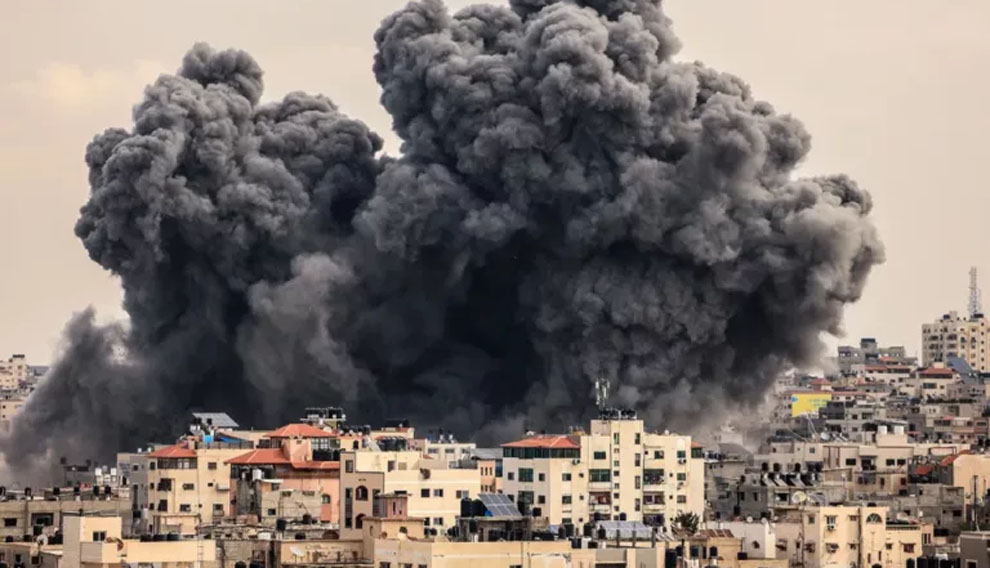
At least 10 killed in Israeli strikes on Gaza
At least 10 people were killed and more than a dozen wounded in Israeli strikes on Gaza early on Thursday, medics with the Gaza health authorities said.
Five people were killed and 20 wounded in an Israeli airstrike on a house in Gaza City’s Zeitoun neighborhood, the medics reported. They warned the death toll could rise as many remained trapped under the rubble.
In a separate incident, five journalists were killed when their vehicle was struck in the vicinity of Al-Awda hospital in Nuseirat in central Gaza, the enclave’s health authorities said. The journalists worked for the Al-Quds Al-Youm television channel.
READ ALSO:
- I was not removed by Tinubu – Ex-Women Affairs minister [VIDEO]
- Ghanaian president approves visa-free entry for all Africans
- Waiting for palliative: Ndume shares on X video of long queues outside Tinubu’s Lagos residence
Palestinian media and local reporters said the vehicle was marked as a media van and was used by journalists to report from inside the hospital and Nuseirat camp.
There was no immediate Israeli comment on the reported strikes.
On Wednesday, Palestinian militant group Hamas and Israel traded blame over their failure to conclude a ceasefire agreement despite progress reported by both sides in past days.
At least 10 killed in Israeli strikes on Gaza
ARAB NEWS
-
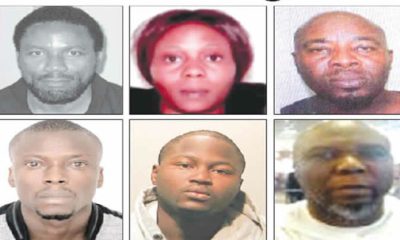
 metro3 days ago
metro3 days agoINTERPOL declares 14 Nigerians wanted for drug, human trafficking
-

 metro1 day ago
metro1 day agoJigawa State governor loses son 24 hours after mother’s death
-

 metro3 days ago
metro3 days agoIbadan stampede: She was treated like a terrorist, Queen Naomi’s sister says about her condition
-

 Business3 days ago
Business3 days agoNNPCL launches production monitoring centre
-

 Business2 days ago
Business2 days agoBe creative, monarch, others challenge Muslim professionals on economic revival
-

 Entertainment22 hours ago
Entertainment22 hours agoMultiChoice announces free access to all DSTV channels for 3 days
-

 metro16 hours ago
metro16 hours agoHeavy security in Ilesa as ex-Osun deputy gov emerges new Owa-Obokun
-

 Auto18 hours ago
Auto18 hours agoLSM MD extols founder’s qualities after latter posthumous industry award

